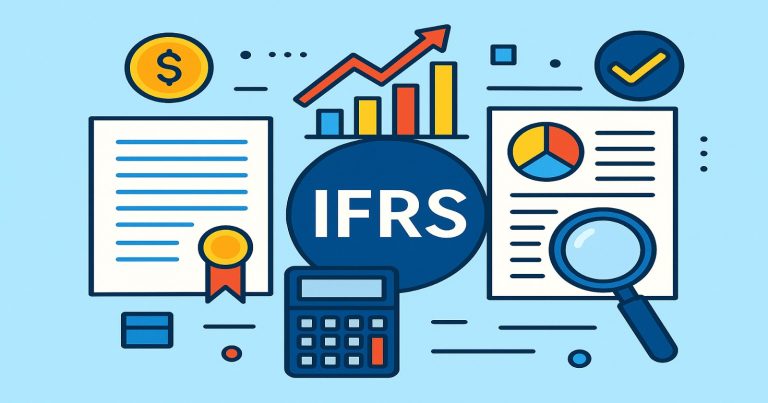IFRS also known as International Financial Reporting Standards, which are the accounting standards developed and maintained by the International Accounting Standards Board (IASB) to guide the preparation of financial statements. The main objective of IFRS is to provide a universal framework for financial reporting that can ensure consistency, transparency, and comparability of financial information between countries. These standards are especially important for internationally operating businesses, as they reduce discrepancies in financial reporting and allow investors to make more informed decisions. IFRS standards are followed by companies in more than 140 countries, including the European Union, Australia, Canada, and many others, while the United States follows a different set of standards known as GAAP, or Generally Accepted Accounting Principles.
What is IFRS?
IFRS stands for International Financial Reporting Standards. They are a package of rules and guidelines through which the world’s businesses describe their financial activities. Essentially, the goal of IFRS is to provide high-quality information to investors and other stakeholders in the global markets to facilitate their judgments and decisions about investing resources with them. Companies should apply a set of rules in reporting their financial performance, position, and cash flows.
The purpose of IFRS is to standardize the world’s accounting practices, such that financial statements can be more closely comparable across jurisdictions. The nature of the globalized economic system makes this increasingly vital where businesses operate internationally and investors look beyond national borders for opportunities.
IFRS Full Form
The full form of IFRS is International Financial Reporting Standards. It is structured to meet the standards required for coherent and transparent accounting standards by businesses worldwide. The purpose is for financial reports to be comparable so stakeholders can easily make decisions.
What is the Purpose of International Financial Reporting Standards?
The main objective of IFRS is to improve the transparency, accuracy, and comparability of financial statements to assist users, including investors, creditors, and regulators, in making better decisions. IFRS achieves this by setting high-quality, transparent, and globally accepted accounting standards that companies can follow when preparing their financial reports.
Companies are allowed to use the same accounting framework in more than one country under IFRS standard way of reporting financial information. It reduces complexity for multinational companies as they don’t have to follow several national accounting standards. It further helps in increasing international trade and investment through uniformity and transparency, which creates an impression of trust in investors and other stakeholders.
For financial analysts and investors, IFRS is of paramount importance because it enables them to make accurate comparisons between companies operating in different countries. It helps in building confidence in the minds of investors, access to capital increases, and the overall stability of the global financial system comes in.
Key Objectives of IFRS
Some of the key objectives of IFRS include:
- Promoting transparency: By having uniform standards, IFRS ensures that the financial statements portray a real and clear picture of any company’s financial position.
- Facilitating comparability: As all businesses across the world are following the same set of rules, it facilitates easy comparison of financial performance across the borders.
- Improving accountability: Companies have to follow the strict rules and hence promote accountability in the way they manage and report financial information.
- Facilitating global business: The international company benefits from the ease of reporting financial data in multiple countries with a standardized form.
Difference Between GAAP and IFRS
The difference between GAAP and IFRS mainly lies in the application of accounting principles in the preparation of financial statements. Both are designed to ensure the accuracy and transparency of financial reports. GAAP mainly used in the United States, while other parts of the world widely use IFRS. These two standards, however, are different sets, and their distinction is important because some multinational companies operate in both the U.S. and overseas.
| Aspect | GAAP | IFRS |
|---|---|---|
| Accounting Framework | Rules-based accounting standards | Principles-based accounting standards |
| Inventory Valuation | LIFO (Last In First Out) method is allowed | LIFO is not permitted |
| Revenue Recognition | Revenue is recognized when it is earned, not when it is received | Revenue is recognized when control of goods or services transfers to the buyer |
| Financial Statements | Comprehensive Income is optional | Comprehensive Income must be shown |
| Treatment of Leases | Operating leases are off-balance sheet | Operating leases are on-balance sheet |
| Development Costs | Expensed as incurred | Capitalized if certain criteria are met |
| Presentation of Income | No requirement to present Other Comprehensive Income separately | Requires Other Comprehensive Income to be presented separately |
| Fair Value Measurement | Fair value is used only in limited cases | Fair value is used more widely, including for investment properties |
The main point is, while GAAP has rules regarding every situation, IFRS is more general guidelines that allow for some interpretation; therefore, differences can lead to variations in financial statements with the same underlying financial activities involved.
For international investors or companies, this knowledge is important so that they can assess or plan financial reports that have to comply with different sets of accounting standards.
Difference Between IFRS and Ind-AS
Ind-AS is the accounting standard adopted by companies in India. These standards are very similar to IFRS but differ in some aspects to suit the Indian economic and business environment. The adoption of Ind-AS was part of the initiative of the Indian government to bring the country’s financial reporting practices closer to global standards.
IFRS and IND-AS treat most items differently despite having many things in common. Indian firms report their financials through Ind-AS, but foreign operations of such companies can adopt IFRS so that they are consistent everywhere around the world.
| Aspect | IFRS | Ind-AS |
|---|---|---|
| Convergence | Fully converged with global standards | Based on IFRS but modified for the Indian context |
| Application of Fair Value | Extensive use of fair value measurement | Fair value is used with some restrictions in specific cases |
| Depreciation of Assets | IAS 16 allows certain revaluation options | Ind-AS 109 also applies fair value but with some adjustments |
| Financial Instruments | IFRS 9 mandates fair value measurement for financial instruments | Ind-AS allows some flexibility in the presentation of OCI |
| Presentation of Other Comprehensive Income | Presented separately in the financial statement | IFRS uses a uniform approach to consolidation |
| Consolidation of Subsidiaries | Ind-AS requires a specific methodology for the consolidation of joint ventures and associates | Ind-AS requires a specific methodology for consolidation of joint ventures and associates |
| Revenue Recognition | IFRS 15 applies to all industries globally | Ind-AS 115 mirrors IFRS 15 but includes Indian tax considerations |
| Leases | IFRS 16 treats operating leases as on-balance sheet | Ind-AS 116 requires the same for operating leases |
Differences reflect specific regulatory, economic, and legal considerations in India. Nonetheless, the overall convergence with IFRS will enable Indian companies to adopt a global approach to accounting while still conforming to local standards.
IFRS FAQs
What does IFRS stand for?
IFRS stands for International Financial Reporting Standards. Global users use these standards to prepare and present financial statements that are transparent and comparable across countries.
Why is IFRS important for global business?
IFRS is crucial because it provides a uniform framework for financial reporting. This helps businesses operating internationally invariably present their financial information, fostering investor confidence and reducing barriers to cross-border investment.
What are the key differences between IFRS and GAAP?
The key differences include that IFRS is principle-basis, while GAAP is rules-basis. IFRS allows the use of fair value accounting more widely, whereas GAAP restricts it. Revenue recognition, lease treatment, and financial statement presentation also differ.
How is Ind-AS different from IFRS?
Ind-AS is based on IFRS but includes certain modifications tailored to the Indian legal and economic context. For instance, the presentation of comprehensive income and the treatment of leases may differ slightly under Ind-AS compared to IFRS.
Can Indian companies adopt IFRS?
While Indian companies must follow Ind-AS for their local financial reporting, companies listed internationally or with foreign operations may apply IFRS to align with global accounting practices.


